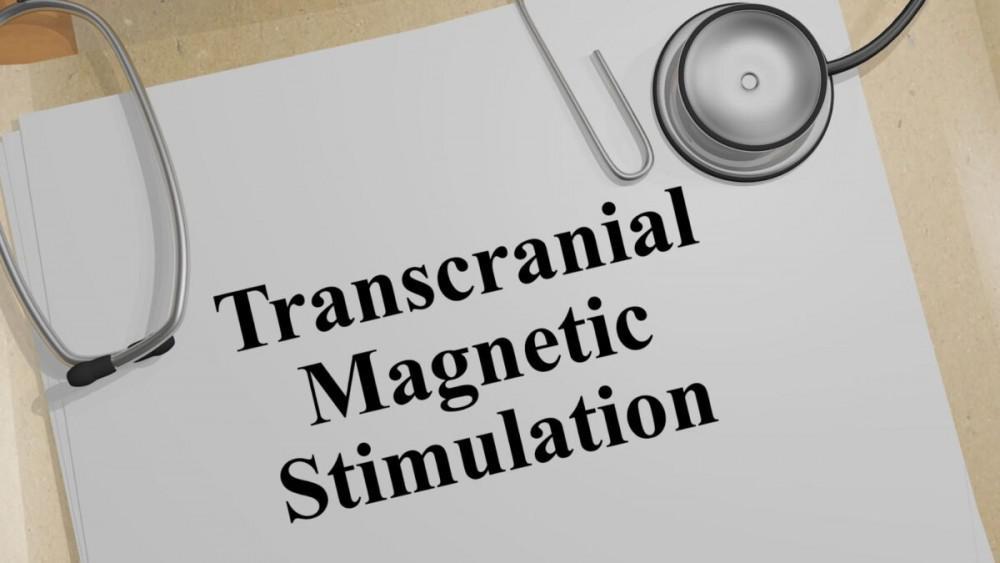Do you have obsessive-compulsive disorder? Are you looking for a breakthrough treatment that can help you overcome your symptoms? If so, then you may want to consider transcranial magnetic stimulation (TMS). TMS is a non-invasive treatment that uses magnets to stimulate the brain. It has been shown to be an effective treatment for OCD and other mental health disorders. In this blog post, we will discuss the benefits of TMS therapy for OCD and how it can help you achieve remission from your symptoms.
Contents
TMS For OCD
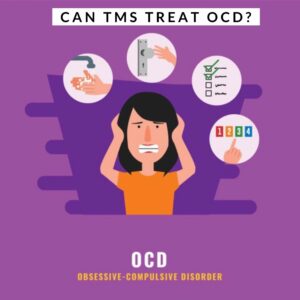
TMS, an acronym for transcranial magnetic stimulation, is a non-invasive treatment that uses magnets to stimulate the brain. It is a recent advancement in the field of psychiatry and has shown promise in treating a variety of mental health conditions, including OCD.
OCD, as one may be aware, is a debilitating mental disorder that characterizes by intrusive and undesirable thoughts (obsessions) that lead to repetitive and often ritualistic behaviors (compulsions). These compulsions are typically an attempt to alleviate the anxiety caused by the obsessions.
While there are a variety of treatments available for OCD, including medication and exposure therapy, TMS is unique in its ability to target the specific area of the brain that is responsible for the symptoms of OCD. In a recent study, TMS was found to be an effective treatment for OCD, with patients reporting a decrease in both obsessions and compulsions.
TMS was first approved by the FDA in 2008 for the treatment of depression, and since then, its efficacy in treating OCD has been well-documented in numerous studies. In fact, a 2017 study published in the American Journal of Psychiatry found that TMS was an effective treatment for OCD when used as an adjunct to traditional cognitive-behavioral therapy (CBT).
While TMS is still considered to be a relatively new treatment, it is rapidly gaining popularity as an alternative to medications and other traditional treatments for OCD. If you or someone you know is struggling with OCD, TMS may be worth considering.
How Does It Work?
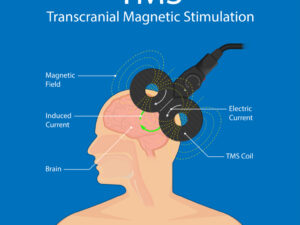
Transcranial magnetic stimulation is a new, non-invasive treatment that involves using magnetic fields to stimulate certain areas of the brain. It is a promising new treatment for OCD that is showing great promise in early studies.
The procedure for this treatment is quite simple. It starts with your respective physician/healthcare provider applying a device to your scalp. The device is then used to deliver magnetic pulses to the region of your brain that is responsible for obsessive-compulsive behaviors. These magnetic pulses work by disrupting the circuitry in your brain that is responsible for these behaviors. The stimulations are typically done for 30 minutes a day, five days a week, for four to six weeks.
The procedure is carried out by a trained professional and is done in an outpatient setting. There are no side effects of this treatment, which is one of the reasons why it is so promising.
TMS is a relatively new treatment, so there is still more research that needs to be done in order to determine its long-term efficacy. However, the early results are promising and it is showing great potential as a breakthrough treatment for OCD. If you or someone you know suffers from OCD, then transcranial magnetic stimulation may be worth considering as a treatment option.
Who Can Undergo This Treatment?
TMS for OCD is a good recommendation for people who suffer from Obsessive-Compulsive Disorder and do not respond well to traditional OCD treatments like Cognitive Behavioral Therapy and medication. TMS is a non-invasive, approval by FDA treatment that uses magnetic pulses to stimulate areas of the brain that are known to be associated with OCD. It is suitable for any and all individuals who suffer from this debilitating mental disorder.
If you or someone you know suffers from OCD and has not been able to find relief with traditional treatments, TMS may be a good option to consider. Talk to your doctor or a mental health professional to see if TMS could be right for you.
Who Should Avoid This Treatment?
TMS is generally considered to be a safe and well-tolerated treatment. However, there are certain individuals who should not undergo this treatment. These include:
- Pregnant women
- People with metal implants in their skull or head
- People with seizure disorders
- Individuals with a pacemaker
- People with stents in the neck or brain
- Children below the age of 18
- People who have recently had a brain injury
- People with certain psychiatric disorders, such as schizophrenia
If you are unsure whether or not you are a candidate for TMS, be sure to speak with your physician. This will help you make an informed decision about whether or not this treatment is right for you.
What To Expect?
If you decide to undergo TMS for OCD, there are some things you might be wondering about. Here are some things to expect:
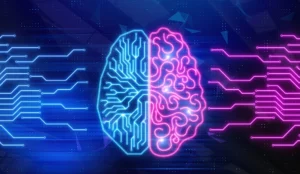
- You will need to commit to attending all of your scheduled sessions.
- You will likely need to undergo a course of treatment that consists of multiple sessions.
- The initial sessions consist of a “mapping” process. This is when the physician will determine the best placement for the magnetic coil. The actual TMS treatment will begin after the mapping process is completed.
- Unlike traditional surgical methods, TMS does not require hospitalization. This means that you can go about your daily life as usual while undergoing treatment.
- There is no recovery time needed after each session. This is so because TMS is a non-invasive procedure. You may experience some side effects, such as headaches or dizziness, but these are typically mild and go away on their own.
TMS is a promising new treatment for OCD that is showing great promise in early studies. If you or someone you know suffers from OCD, then transcranial magnetic stimulation may be worth considering as a treatment option. Talk to your doctor or a mental health professional to see if TMS could be right for you.
Benefits
TMS for OCD has an array of benefits. These advantages make it a great treatment option for those who suffer from this debilitating mental disorder. Some of the benefits include:
- TMS is a non-invasive procedure: The fact that TMS is a non-invasive procedure is one of its biggest advantages. Unlike other treatments for OCD such as psychiatric medications and deep brain stimulation, TMS does not require surgery or any invasiveness. This means that the risks associated with the treatment are much lower, making it a safer option for patients.
- TMS is an effective treatment: In clinical trials, TMS has evidence to be an effective treatment for OCD. In one study, 43% of patients who underwent TMS showed significant improvement in their OCD symptoms after just six weeks of treatment.
- TMS is covered by most insurance plans: This means that patients who are interested in undergoing treatment will likely be able to do so without having to pay out of pocket. Be sure to follow up with your respective providers to cross-verify facts and updates on insurance.
- TMS has few side effects: One of the great things about TMS is that it has very few side effects. The most common side effect is headaches, which typically go away after a few days of treatment. Some other potential side effects include dizziness, tingling, and nausea, but these are usually mild and temporary.
If you or someone you know suffers from OCD, TMS may be a good treatment option to consider. It is important to speak with a qualified mental health professional to see if TMS is right for you.
Drawbacks
Just like with any other treatment, there are some potential drawbacks with TMS for OCD. These include:
- TMS is a new treatment: Because TMS is such a new treatment, there is still much unknown about it. This means that there is still some uncertainty surrounding its long-term effectiveness and safety.
- TMS requires multiple sessions: Unlike other treatments such as medication, TMS for OCD requires multiple sessions in order to be effective. This means that it can be time-consuming and expensive.
- TMS is not a cure: While TMS can be an effective treatment for OCD, it is important to remember that it is not a cure. This means that symptoms may return after treatment is completed.
So, there you have it! TMS for OCD is a new and promising treatment option that comes with a host of benefits, but also some potential drawbacks. Be sure to speak with your mental health professional to see if TMS is beneficial for your needs.
Things To Consider
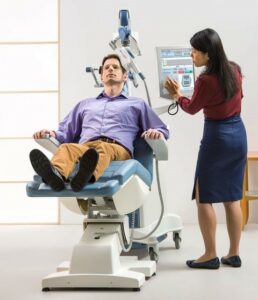
If you are considering TMS as a treatment approach for OCD, it is important to keep some points in consideration.
- Find the right physician: When it comes to TMS, not just any physician can provide the treatment. It is important to find a qualified physician who has experience in providing TMS.
- Weigh the severity of symptoms: When deciding if TMS is the right treatment for you, it is important to weigh the severity of your OCD symptoms. If your symptoms are mild, you may want to explore other treatment options before considering TMS.
- Check if your insurance covers it: As mentioned before, TMS is typically covered by most insurance providers. However, it is still important to check with your specific provider to see if TMS is covered under your plan.
- Be patient: Because TMS is a new treatment, it is important to be patient when it comes to seeing results. It may take multiple sessions before you start to see any significant improvement in your OCD symptoms.
With these considerations in mind, you may be able to better decide if TMS is the right treatment approach for you.
Alternate Methods
While TMS is only one of the many available options for OCD treatment, there are also other methods that may be effective. These include:
- Electroconvulsive therapy (ECT): ECT is a type of treatment that uses electrical stimulation to the brain in order to treat mental illness. It has been found to be effective in treating OCD, although it does come with some potential side effects.
- Deep brain stimulation (DBS): DBS is a type of treatment that involves surgically implanting a device in the brain in order to deliver electrical stimulation. It has been found to be effective in treating OCD, although it is a more invasive procedure.
- Psychotherapy: Psychotherapy is a type of therapy that focuses on talking and working through mental health issues. It can be an effective treatment for OCD, although it may take some time to see results.
- Cognitive-Behavioral Therapy (CBT): CBT is a type of therapy that helps patients to change the way they think and behave. This can be an effective treatment approach for OCD as it helps patients to learn how to cope with their obsessions and compulsions in a more healthy way.
- Exposure and Response Prevention (ERP): ERP is another type of therapy that focuses on helping patients to face their fears head-on. This happens by gradually exposing them to their triggers. It also helps in teaching them how to respond in a different, more positive way.
- Medication: Medication can also be an effective treatment approach for OCD. There are many different types of medication that can be used to treat OCD, so it is important to speak with a qualified mental health professional to see if this is the right option for you.
While TMS is a new and promising treatment option for OCD, there are also many other effective methods available. Be sure to speak with your mental health professional to decide which approach is best for you.
Conclusion
In conclusion of the above, TMS for OCD is a new and promising treatment option that comes with a host of benefits. However, it is important to keep some considerations in mind when deciding if TMS will be a suitable option. Be sure to speak with your mental health professional about all of your options. This can help you to make the best decision in order to satisfy your needs.
If you or someone you know suffers from OCD, you may consider Therapy Mantra for assistance. We have a team of highly qualified mental health professionals who can provide you with the treatment and support you need. Contact us today to book an online therapy session or download our free OCD treatment app on Android or iOS for more information.
